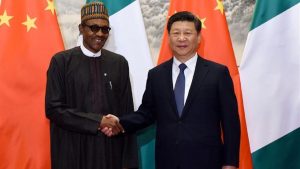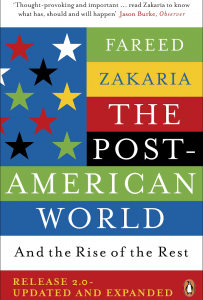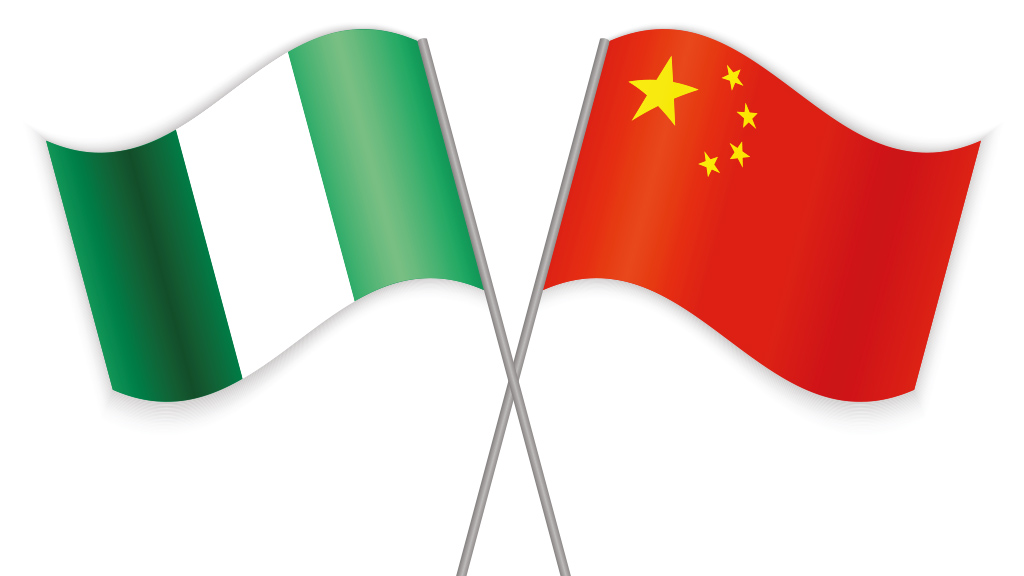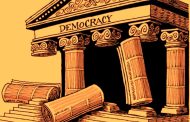October 1st has the same significance for both China and Nigeria. It is their Independence Day, 1949 for China and 1960 for Nigeria. It means that China is older by eleven (11) years. Eleven years is a lot but not to the degree that China is ahead of Nigeria today.

President Buhari & President Xi Jinping

Enacting the 2018 Nigeria – China currency Swap Agreement
China is a civilisation rather than a state. That much can equally be said for Nigeria to the extent that Nigeria is, in the words of Ali Mazrui, the largest concentration of blacks under one government in human history. Whether majority of Nigerians note that historical stature is not clear. Whether they do or not, the power that comes from demographic profile y is common to both. China is over a billion while Nigeria is about 200 million, heading to being a global demographic power in a few decades hence.
But has Nigeria shown any self-awareness? There is little evidence to suggest that Nigeria is self-aware. A number of things that still happen in the country would never, ever happen if the contrary were the case. The ease with which Nigerian at the highest level of responsibility can sell the country for a mere pottage is not the case with China. In the case of Nigeria, this applies to both the power elite and majority of the citizens. It is completely to the contrary for China where the Chinese State has a deliberate policy of promoting Chinese nationalism and where the leadership recruitment process privileges absolutely nationalist credentials. So, there may be more communists in Italy than there are in China today as the joke goes, they take nationalism seriously.
Unlike Nigeria, China has a political party that grooms leaders. The Chinese Communist Party is a hundred times more democratic and intelligent than the typical political party in Nigeria even as some commentators would contest this on the ground that it is a communist party. Prof David Shambaugh, one of the thorough going American experts on China would say that China would suffer stagnation and crisis if the Chinese Communist Party does not liberalise. That is the key claim in his 2016 book, China’s Future where he elaborates the point about China arriving at that stage in her impressive developmental breakthrough where the economic, social, political, cultural, technological, environmental, national security and foreign relations are recording diminishing returns. Interestingly, this is not something that Chinese leaders would disagree with, having said so themselves since 2007. What leading experts such as Shambaugh who rely on facts and rationalism do not reckon with is that the party is reflexivist in orientation. It is not a party that would allow itself and China’s progress to be ruined by dogmas and formulaic inflexibility. With such a party standing guard, taking note of contradictions and how to manage same, only the sky is the limit in terms of China’s journey to global primacy.

Deng Xiaoping – the undisputed architect of modern China
 Nigeria today cannot boast of a well managed political party, even an informed liberal or conservative one. That difference is fundamental because it means there is no machinery that thinks for Nigeria, superintends such thinking, recruit leaders and insist on merit up to a point. In the absence of that, many elements who should not even be messengers in Government Houses end up as the landlord. The scars of such power-miss-road are everywhere. That is not the case in China where madness is not tolerated in the name of democracy or freedom. Tolerance for democracy as madness in Nigeria has emboldened some people, including some diplomats, to say or write that Nigeria cannot go anywhere or will not make it but only for them to, paradoxically, earn the wrath of Nigerians. In other to escape such fate, many non-Nigerians who marvel at how Nigeria mismanages itself no longer talk or write much. So, Nigeria’s problem worsens in the sense that while saying Nigeria is finished could contribute to that reality, not warning Nigeria against certain self-inflicted injuries could equally contribute to a false sense of security. Double wahala for dead bodi!
Nigeria today cannot boast of a well managed political party, even an informed liberal or conservative one. That difference is fundamental because it means there is no machinery that thinks for Nigeria, superintends such thinking, recruit leaders and insist on merit up to a point. In the absence of that, many elements who should not even be messengers in Government Houses end up as the landlord. The scars of such power-miss-road are everywhere. That is not the case in China where madness is not tolerated in the name of democracy or freedom. Tolerance for democracy as madness in Nigeria has emboldened some people, including some diplomats, to say or write that Nigeria cannot go anywhere or will not make it but only for them to, paradoxically, earn the wrath of Nigerians. In other to escape such fate, many non-Nigerians who marvel at how Nigeria mismanages itself no longer talk or write much. So, Nigeria’s problem worsens in the sense that while saying Nigeria is finished could contribute to that reality, not warning Nigeria against certain self-inflicted injuries could equally contribute to a false sense of security. Double wahala for dead bodi!
There are those such as Professor Charles Soludo who once said that the world was/is waiting for Nigeria to replicate the Chinese experience. It is not clear if he still subscribes to that, 13 years after making the declaration. The assumption was that he must know since he was key in the economic strategy camp of the Obasanjo regime. But what exactly did China do to get to where it is today?
That is a slippery question. China nurses two historical scars. One of it is how the Industrial Revolution did not take place first in China but in the West when China was already ahead. The second is the ‘centuries of humiliation’ narrative in Chinese history. Some scholars would say that these two historical experiences remain the key drivers of the resurgence of China on a world scale. It is a debatable but believable argument. Otherwise, what is that extraordinary thing that China did as to achieve its status today? Nearly nothing other than that Mao’s death and the emergence of Deng Xiaoping marked a turning point. Xiaoping who was suspected to habour liberal attitudes to development strategy was worried that China was simply behind. With such concern, he could declare for any model of development, saying the pigmentation of the cat didn’t matter so long as it could catch mouse.

Prof. Charles Soludo

Is Nigeria joining the rest?
The rupture with planning that ‘Socialism with Chinese characteristics’ brought about is the Chinese miracle of today and it is not based on any doctrinaire approach except that the party was there to ensure that the Chinese State and its intellectuals and practitioners of statecraft were the ultimate definers of the red lines. To that extent, China is a developmental state although that is not what they call it. For them, the model is officially called a ‘Socialist Market Economy’.
So, why might Charles Soludo have been confident that Nigeria could replicate China on a global scale? With the sort of elite Nigeria has? Perhaps why he thought so and perhaps think so is the question journalists should ask him next time. Whatever he says in response to that, it is a strategic statement. It is strategic in the sense of the performative role of ideas in terms of creating the reality they speak of. In Soludo’s discipline, the slogan for that is that “economics create the economy”. Still, ideas will not create the reality it speaks of if the citizens and the elite are busy denigrating Nigeria because it has not created prosperity and the competition for the little available has exacerbated difference.
In 2009, Fareed Zakaria published his Post American World and the Rise of the Rest. Today, China is the epitome of the rest, the rest being a reference to non-Western Civilisations now gathered together in BRICS, Brazil representing Latin America as a civilisation; Russia standing for the Orthodox Church which guards its separateness from the West jealously; India representing Hinduism, China for Confucianism and South Africa for the African Civilisation even though Huntington gave that a grudging recognition as a civilisation.
If only Nigeria were to be that self-aware, the path to follow appear clearly marked. But, how can it even identify any part at all, not to talk of following the clearly marked path with the quality of leadership at ALL levels of the society today? That makes the question of what else between China and Nigeria beyond having a same birthday a tough question to contemplate!




























